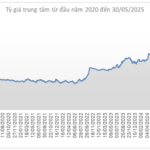“Manipulation” traps in the stock market: a look at some cases
Elation, despair, hope, and eventually having to sell his house to pay off debts—these are the emotions that Mr. Le Ngoc Nong from Quang Nam province experienced as he chased the “wave” of “FLC-family” stocks. Attending the first-instance trial of a market manipulation case involving FLC Group, Mr. Nong hoped to regain his losses.
However, the court only ruled that the victims would be compensated 7,215 VND per ROS share, and related parties would receive 5,466 VND. There was no basis for compensation for the other five stocks: AMD, HAI, GAB, FLC, and ART.

Individual investors bear the brunt of stock market manipulation. Photo: Minh Dung |
In addition to the case at FLC, several individuals have been criminally prosecuted for market manipulation in cases involving Louis Holding and Binh Thuan Industry and Mineral Joint Stock Company (KSA) in recent years.
A common thread in these cases is that the leaders of listed companies, such as Mr. Do Thanh Nhan (Chairman of Louis Holdings) and Mr. Trinh Van Quyet (former Chairman of FLC Group), colluded with securities company leaders or directed their relatives and subordinates to establish and use hundreds of securities accounts to trade large volumes of stocks frequently. This created artificial supply and demand, driving up stock prices to many times their actual value and creating a “stock manipulation trap” that attracted adventurous investors who liked to ride the waves.
At FLC Faros, a subsidiary of FLC Group, individuals inflated the chartered capital and “beautified” the company’s financial reports to create an attractive “picture” for investors and increase the value of ROS shares.
In the National Assembly, Ms. Mai Thi Phuong Hoa, Vice Chairman of the Judicial Committee of the National Assembly, pointed out a common feature in these cases: the perpetrators are becoming more sophisticated and daring. They are even willing to involve their families and trusted associates.
In addition, some management agencies have been lax in certain periods. “Notably, some behaviors and tricks have occurred many times but have not been detected or have only been administratively handled. This creates a sense of impunity among the perpetrators,” said Ms. Hoa.
Mr. Nguyen Thanh Ha, Chairman of SBLaw Law Firm, added that in addition to the poor legal compliance of some individuals and organizations, manipulation often occurs within a certain period before the abnormal fluctuations in stock prices become apparent. Moreover, the involvement of a large number of trading accounts makes it challenging for management agencies to detect and prevent violations during the manipulation phase.
Mr. Ha also acknowledged that the penalties for violations of securities and stock market-related activities in the 2019 Securities Law, 2020 Investment Law, 2020 Enterprise Law, 2015 Civil Code, 2015 Penal Code (amended and supplemented in 2017), and related decrees and circulars are relatively light and not commensurate with the consequences of the violations on society and investors.
“This has led to an increase in the number and severity of violations in the securities field,” he said.
How to minimize risks?
To reduce the risk of stock market manipulation, the Ministry of Finance has published a draft amendment to the 2019 Securities Law, aiming to legalize the regulations on market manipulation from Government Decree 156/2020 in Article 12 of the Law. It also supplements the prohibition of transactions by insiders of public companies, collective investment funds, and related parties without disclosing information about their intended transactions of shares or fund certificates.

Modern technology systems will help management agencies easily detect abnormal transactions in the market. Photo: Hoang Thang
|
From the perspective of a market member, Mr. Do Bao Ngoc, Deputy General Director of Vietnam Construction Securities Joint Stock Company (CSI), said that the provisions on market manipulation in the 2019 Securities Law are still quite vague. Therefore, it is challenging to distinguish between normal investor transactions and manipulative transactions by a group of investors based on the old regulations.
According to Mr. Ngoc, the new policies need to be more specific regarding trading behaviors, such as buying and selling the same stocks within a short period and the appearance of cross-transactions. In addition, it is necessary to supplement regulations requiring investors to identify themselves electronically through citizen identification chips.
“This helps us verify that each securities account is opened by a real investor rather than a virtual one used by a group of investors to manipulate the market,” he said.
Mr. Nguyen Thanh Ha also proposed supplementing guiding documents on calculating “illegal profits” and “investor losses” to ensure consistency in practical application, thereby reducing the time required for investigating and handling stock market manipulation offenses under Article 211 of the 2015 Penal Code, amended and supplemented in 2017.
In addition, he suggested adding the consequences of stock market manipulation, such as “causing financial and monetary insecurity” or “affecting the normal operations of the stock market.” He also recommended amending and supplementing the penalties for market manipulation, increasing the maximum prison sentence from 7 years to 20 years and adding supplementary penalties, such as banning the assumption of certain positions or practicing in a particular field for 5-7 years.
In the long term, Dr. Nguyen Huu Huan, a lecturer at the University of Economics in Ho Chi Minh City, emphasized the need to control the quality of listed companies. Currently, violations related to information disclosure, financial reporting, and business results are prevalent. In some cases with signs of criminal offenses, the role of the auditing company is very vague, while in theory, the auditing company should detect violations or issues within the company and provide opinions to exclude or warn investors and management agencies.
“There is a need to tighten the regulations and enhance the role and responsibility of auditing companies in detecting violations of listed companies to protect the rights and interests of investors,” said Dr. Huan.
Van Phong
Securities Authorities Charge Seven in Scheme to Manipulate CMS Stock
To manipulate the price of CMS stock, the group led by Tran Binh Minh employed multiple securities accounts to buy and sell the CMS stock. They aimed to create a false sense of liquidity and volume, enticing unsuspecting investors to join the scheme. This orchestrated effort allowed the group to control the stock’s price movement, creating an illusion of stability and potential growth.
The Billionaire’s Shadow: Unveiling the Mystery Woman with a Fortune to Behold
The woman’s family currently holds over 5 million shares of COTANA, which equates to approximately 13.4% of the company’s capital.



















![[IR AWARDS] June 2025 Disclosure Calendar: Mark Your Dates](https://xe.today/wp-content/uploads/2025/06/HinhT6_01-218x150.png)





















